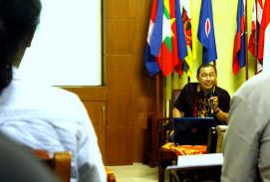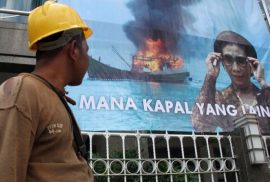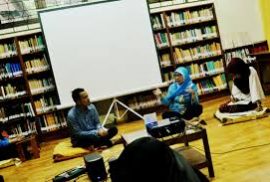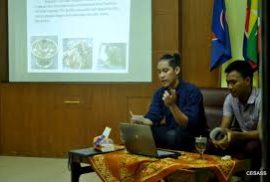How far do we know our neighbors? Neighbors are probably the closest people who actually keep the enigma and do not prejudice. But, cinema can help you uncover our nearest neighbor’s curtain: Malaysia. There are five movie options that can be your window to peek our neighbors Malaysia. Sepas made by Yasmin Ahmad reveals intricate interethnic relations in Malaysia. Meanwhile, Ho Yuhang through Rain Dog climbs the dark alley of ethnic Chinese conditions in Malaysia. Similarly, Songlap made by duo Effendy Mazlan and Fariza Azlina Isahak unmistakably reveals the other side of the sparkling capital of Kuala Lumpur. By contrast, Dain Iskandar Said via Bunohan brings you to recognize the face of Malaysia’s peripheral that is not less complicated. And, lastly, Mamat Khalid invites you to taste the taste of classic Malay cinema wrapped in ‘noir movie’ style in the Kala Bulan Mengambang which is loaded with contemporary Malaysian political allegories. So, watch the Malaysian cinema and seize the opportunity to recognize it. (Budi Irawanto)
Training was conducted by PSSAT, with a focus on the progress of Southeast Asia, and relevant future movements. Professor Muhtar Mas’ud spoke about rediscovering the meaning of the ASEAN Economic Community (AEC). According to Prof. Muhtar Mas’ud (MEA), that masyarakat is different from the komunitas. in English masyarakat is society; and komunitas is community. In the field of sociology, it is related to the meaning of the relationship of the two words. In society, relationships are built on the basis of needs and can change. While in the community, the relationship is more emotional. Relationships built on the basis of closeness such as familial relationships, relationships because of one clan, etc. In this connection, membership can not be changed and in and out. Mas’ud later said that Indonesia then considers the Economic ASEAN Community to be an ASEAN Economic Community (MEA) not as a Community of ASEAN Economic Community (KEA). If by community, this means that one member will not harm other members. This means there will be no suspicion. But in fact, the affairs of trust among countries in Southeast Asia is still very low between one and the other.
When reading the literature on the history of Southeast Asia, we often take to the depiction of a character who has a position or power in a community context. The depiction of Southeast Asian history is then often associated (intentionally or unintentionally) strictly with economic or political aspects. This makes reading in the literature of Southeast Asian history often plastered with emphasis on facts, dates, names or personalities.
However, we will encounter different things when reading A History of Southeast Asia: Critical Crossroads. This is one of a professor’s works from Australian National University, Anthony Reid. This book at least provides a new offer to the study of the history of Southeast Asia. In this book, the reading of the history of Southeast Asia places more emphasis on the aspects of its context, processes, and historical intersections.
“Area studies programs were closed or merged into other units; on the eve of the September 11 attacks, half of the top political science departments in the United States did not have a Middle East studies program. ”
—
The above sentence was written by Francis Fukuyama quoted by Budiawan as the opening of the SEA-Talks # 5 on Tuesday afternoon (29/01/2016) in Center for Southeast Asian Social Studies (CESASS). It is a writing describing the recent fate of institutionalized regional studies in the United States. The view of the Crisis on the study of the area by Francis Fukuyama was also supported by the writings of Professor Robert Elson which stated that, 10 years ago, Asian Studies in Australia had a strong activity. But conditions have now declined, and it is believed that only Australia National University remains in this crisis.
The news of sinking foreign ships that steal fishes in Indonesian territorial waters lately has become more widespread. Almost all mass media preach about this government action. This action is not new in Indonesia, it’s just that the news has just been noticed by the media, and it is considered unusual therefore it gets attention from the public.
In this era of globalization where relations between countries become something important, especially Indonesia’s relationship with countries in ASEAN the strict action of a country to foreigners will of course affect the good relations of both countries. If we look through the case of the sinking of this foreign ships, then the Indonesian government’s actions that bombing the foreign ships without negotiate with its home country can be inferred to affect the good relations of both countries.
The afternoon was overcast and a moment later it was raining heavily. In the not-so-extensive library room, a group of audiences had sat sweet and relaxed, waiting for Anthony Chen’s Ilo-Ilo to be screened. This 100 minute movie, apart from the numerous awards it earns, is worth talking about. The film itself is set in 1997, which we know at that time countries in the Asian region experienced a terrible economic crisis. The economy is paralyzed, unemployment everywhere, and Ilo-Ilo recording all of it through the simple relations of the employer and the maid, binding his characters in socio-economic relationships which then changing meaning over time, into a strong psychological relationship.
Think of yourself as a teenager, enthusiastic about the world. You have ambitious goals, which will help you achieve your dreams. You want to be a teacher, a lawyer, a doctor, or maybe an engineer. You see your body as a freshly bloomed flower, and enjoy immersing yourself in a romantic love story. However, life sometimes overturns all expectations. You are asked (or rather “forced”) to marry in order to improve the fate of the family. You are forced to marry in order to avoid sin. You are forced to marry by custom. You live your life as a mother, even though you’re still a child. You marry to obey your parents, and now you must obey a husband you do not recognize. Your dreams of becoming a lawyer, teacher, or doctor instantly waver.
In the first and second week of September, the Standard Index of Air Pollution in Pekanbaru Riau stayed in the status of “very unhealthy” and “dangerous”. The Governor in act of Riau must announce the condition of Air Pollution Emergency. The post-decision of the status does not provide a significant meaning for the prevention of this smoke disaster. Until now, the thick haze still fluctuates in covering Pekanbaru and other cities in Sumatera Island and Kalimantan. Conversely, pressure on the Governor in act is stronger to evacuate 6.7 million citizens of Riau, even bringing back the desire for independence for a group of people who lost trust to the Central Government. Along with this haze calamity as well, the increasing demand for HTI and oil palm plantations getting higher, to be responsible, revoked its license and withdraw from Riau. Finally, only heavy rains which can calm down the anger of the people who become more flare up because of the haze.
Aekachai Ounsup Mike as the speaker opened the discussion that afternoon with the question “what you guys think when you hear about Thailand” then the participants also revealed their respective answers, ranging from Thai cuisine, film, language and also transgender. Mike justified these things, then Mike also explained that Thailand does many more than that. There are still many other things that are more interesting, such as the culture, how the daily life of the Thai people, and places of interest in Thailand.
People in Southeast Asia and surrounding areas are believed to have the same root or from the same source. It is characterized by several cultures, customs, and values that are still reflected in the life of people in Southeast Asia and beyond. This thesis was presented by Ronnie Hatley Ph.D in his presentation at SEA Talk discussion of Center for Southeast Asian Social Studies in collaboration with American Institute For Indonesian Studies. This discussion was held on Thursday, February 18, 2016, followed by dozens of academics and researchers from various scientific backgrounds.










